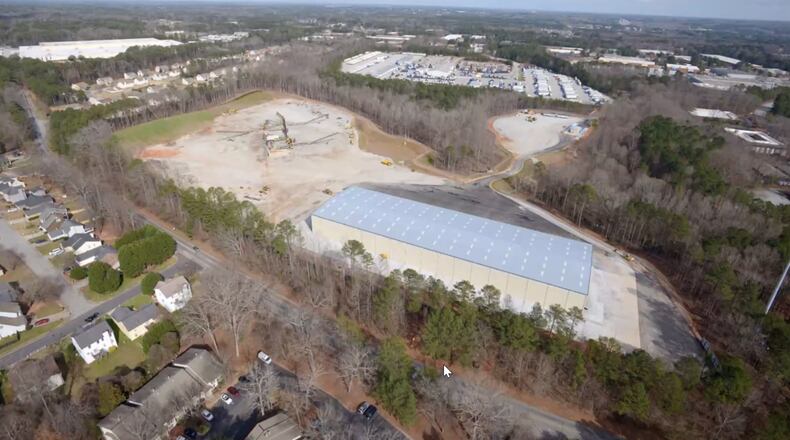The state’s highest court has been asked to hear a controversial case in south DeKalb County and could decide if a recycling plant should be allowed to crush concrete near residential neighborhoods.
The case centers around Metro Green Recycling, which built a plant near Snapfinger Woods Drive and Miller Road in Stonecrest, and whether the company went through the proper steps to obtain its solid waste handling permit. For roughly five years, the factory has been the center of lawsuits, protests and accusations of environmental racism because the plant was built near residential neighborhoods in a city that is more than 93% Black.
A local judge sided with community activists and the city last summer, temporarily barring Metro Green from conducting any work. But an appeals court panel reversed that ruling in mid-July, ruling that state regulators have the final say on issuing permits and the city didn’t follow the proper channels to revoke its support, rushing into court prematurely.
Stonecrest and activist group Citizens for a Healthy and Safe Environment (CHASE) have since filed notices of appeal the case to the Georgia Supreme Court, which will get to choose whether or not to add it to its docket. The city and CHASE argue the appeals court “ruled against local residents on narrow procedural issues” and expect the state’s top court to continue to prevent Metro Green from operating.
“We are disappointed in the decision but remain committed to protecting our neighbors and families living in Metro Green’s shadow, and to fighting the unjust pattern and disproportionate impacts of polluting industries in and around communities of color,” Renee Cail, president of CHASE, said in a prior emailed statement.
Richard Robbins, an attorney representing Metro Green, said he expects the Supreme Court to pass on the case and allow his client to get back to work.
“We are disappointed that they have decided to prolong this injustice to our client with yet more legal maneuvering,” he said in an email. “Our client needs to get back to running a lawful and important business.”
Credit: Jenni Girtman
Credit: Jenni Girtman
The lawsuit is nearly as old as the city of Stonecrest, which was founded in 2017. DeKalb officials initially denied Metro Green’s project, but the company was able to get the support of then-Stonecrest Mayor Jason Lary.
In May 2018, Lary wrote a letter to the Georgia Environmental Protection Division endorsing the project. Michael Harris, Stonecrest’s city manager at the time, wrote a subsequent letter saying that Metro Green’s plans complied with the city’s zoning laws and the county’s solid waste plan, which DeKalb leaders contest.
By October 2019, the EPD issued Metro Green a solid waste handling permit, allowing it to take in unsorted construction debris for processing and recycling. Activists and residents said the activity kicks up dust and creates noise, which is unbearable to its neighbors. Metro Green’s legal team denies this.
Amid the controversy, Lary revoked his support of the project, and in August 2020, Stonecrest filed a temporary restraining order against Metro Green to try to stop construction. Lary would later resign in disgrace after being caught stealing pandemic relief funds.
The legal action would grow into a lawsuit where Stonecrest, DeKalb County and CHASE were each suing Metro Green and the EPD.
The EPD’s attorneys argued that the letter from Stonecrest endorsing the project fulfilled the state agency’s oversight requirements when it initially issued Metro Green’s permit. The appeals court panel agreed, ruling that Stonecrest did not contest the permit with the EPD and instead went to the courts.
Regardless of whether the Supreme Court decides to hear the case, it will have to go back to a trial court and will have to be dismissed before Metro Green can resume operations.
About the Author






